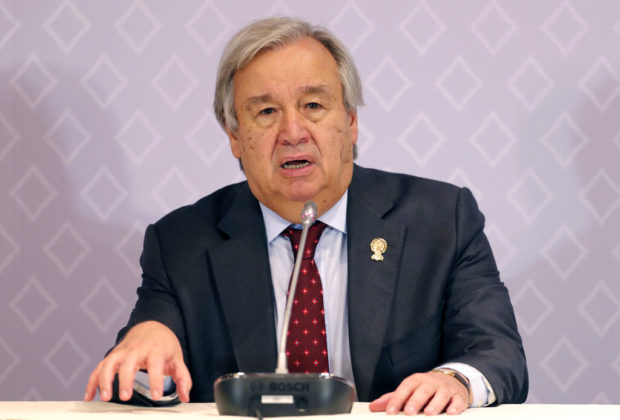
United Nations Secretary-General Antonio Guterres speaks during a press conference at The Association of Southeast Asian Nations (ASEAN) summit in Nonthaburi, Thailand, Sunday, Nov. 3, 2019. (AP Photo/Aijaz Rahi)
NONTHABURI, THAILAND—Ahead of the United Nations climate change conference in Spain in December, Southeast Asian leaders have called on developed nations to fulfill and scale up their financial commitments to support the adaptation and mitigation actions of their countries, among the most vulnerable to the effects of climate change.
In a joint statement issued by the Association of Southeast Asian Nations (Asean) during its summit here earlier this week, the leaders also called on rich nations to provide adequate financing to the Green Climate Fund, taking into account the needs of Southeast Asian countries and other developing nations.
“We emphasize that adequate resources and the ability of [Asean countries] and other developing country parties to access support from the Green Climate Fund, the Global Environment Facility and the Adaptation Fund should be ensured and facilitated,” they said.
Set up by parties to the UN Framework Convention on Climate Change (UNFCCC) in 2010, the fund was created to support efforts of developing countries to mitigate the effects of climate change.
Paris pledges
In the Paris talks in 2015, parties pledged to mobilize $100 billion a year by 2020. In October, wealthy countries promised nearly $9.8 billion over the next four years for the fund, slightly higher than the first pledging conference in 2014.
So far, the fund has allocated $5.2 billion to 111 mitigation and adaptation projects in 99 countries, including construction of resilient housing and rehabilitation of mangrove forests in Vietnam’s coastal communities and the development of the green bus rapid transit system in Karachi, Pakistan.
Aside from their financial commitments, the developed countries, seen as historically responsible for climate change, must fulfill their commitments to reduce their emissions, the Asean leaders said.
They stressed that wealthy nations should provide timely, effective and predictable support to their member-states for technology development and transfer, as well as capacity-building, as agreed in the Paris talks.
‘Climate emergency’
“We call upon the developed country parties to support international academic partnerships with [Asean countries] and other developing country parties to strengthen the capacity of national experts involved in the Greenhouse Gas Inventory and national reporting under the UNFCCC,” they said.
During the Asean-UN summit on Sunday, UN Secretary General Antonio Guterres called on the Southeast Asian leaders to do more to “confront the world’s climate emergency,” noting that four of 10 countries most affected by climate change are in the region.
“Seventy percent of global population that will be more affected by rising sea levels are in countries both within Asean and countries that will be represented at summits,” Guterres said.
He cited a new research that showed rising sea levels could affect more people by 2050 than previously thought, threatening to erase cities in Southeast Asia, like Ho Chi Minh and Bangkok.